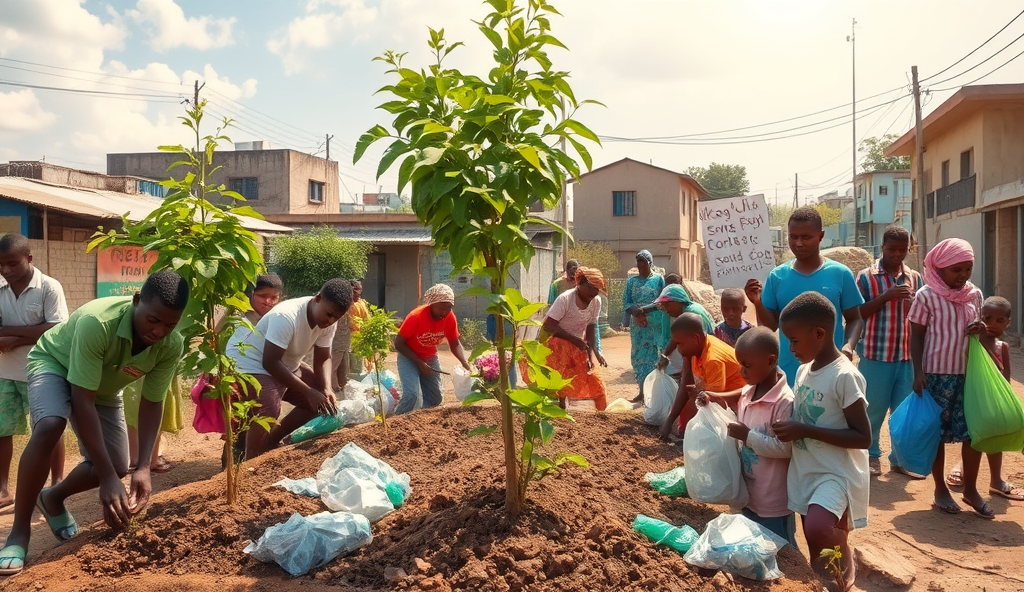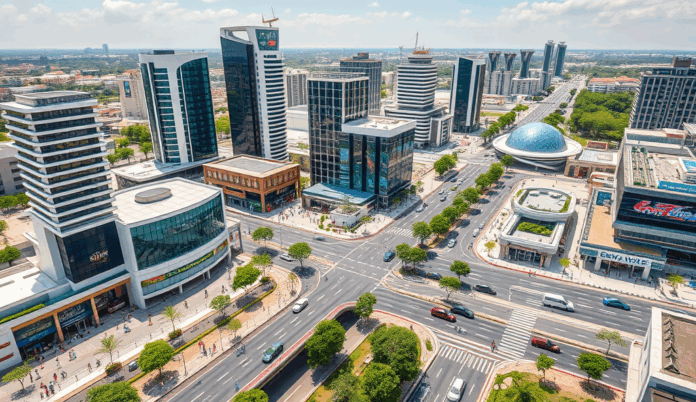Introduction to the Amuwo-Odofin Environment Drive initiative
The Amuwo-Odofin Environment Drive is a community-led initiative addressing pressing environmental challenges in Lagos, with over 60% of residents reporting concerns about waste management and pollution. Launched in 2021, it combines grassroots participation with local government support to improve sanitation and green spaces across the district.
This program focuses on practical solutions like monthly clean-up exercises, recycling awareness campaigns, and tree-planting projects tailored to Amuwo-Odofin’s urban landscape. By engaging schools, markets, and religious institutions, it fosters collective responsibility for environmental sustainability.
The initiative’s success hinges on measurable targets, including a 40% reduction in illegal dumping sites by 2025. These efforts align with broader Lagos State environmental policies while addressing local priorities, setting the stage for its detailed objectives.
Key Statistics

Objectives of the Amuwo-Odofin Environment Drive
The Amuwo-Odofin Environment Drive has reduced illegal waste dumping by 40% in targeted zones improving public health and lowering malaria risks linked to stagnant waste.
Building on its community-led approach, the Amuwo-Odofin Environment Drive aims to achieve three core objectives: reducing waste pollution, increasing green spaces, and fostering sustainable habits among residents. These targets directly address the 60% of locals who identified waste management as a top concern, with measurable goals like eliminating 40% of illegal dumpsites by 2025.
The initiative prioritizes education through school programs and market sensitization campaigns to shift behaviors toward recycling and proper waste disposal. Simultaneously, it seeks to plant 5,000 trees by 2026, countering urban heat effects while aligning with Lagos State’s broader environmental policies.
By integrating grassroots feedback with government resources, the drive ensures objectives remain practical and locally relevant. This foundation supports the next phase: implementing key activities like clean-up exercises and recycling hubs across Amuwo-Odofin’s neighborhoods.
Key activities and programs under the initiative
Residents can join the Amuwo-Odofin Environment Drive by registering for monthly clean-up events at designated zones where over 500 volunteers currently contribute to maintaining cleaner streets and schools.
The Amuwo-Odofin Environment Drive implements monthly community clean-ups across 12 designated zones, mobilizing over 500 volunteers per session to clear illegal dumpsites and rehabilitate public spaces. These efforts complement the installation of 15 recycling hubs in high-traffic areas like Festac Town and Mile 2, where residents can deposit sorted waste for processing.
Educational programs form another pillar, with environmental clubs established in 20 local schools and quarterly workshops at markets like Agboju and Alakija. These initiatives teach practical skills like composting and upcycling, directly addressing the waste management concerns raised by 60% of residents in earlier surveys.
Tree-planting campaigns have transformed barren areas along Badagry Expressway into green corridors, with 1,200 saplings planted since 2023 toward the 5,000-tree target. These hands-on activities demonstrate how grassroots action translates into measurable environmental benefits for Amuwo-Odofin neighborhoods.
Benefits of the Amuwo-Odofin Environment Drive to local residents
The initiative’s clean-up efforts have reduced illegal waste dumping by 40% in the past year with over 200 tons of recyclables processed through its 12 hubs directly benefiting 1200 households earning supplemental income.
The Amuwo-Odofin Environment Drive has reduced illegal waste dumping by 40% in targeted zones, improving public health and lowering malaria risks linked to stagnant waste. Residents now enjoy cleaner streets and safer play areas for children, particularly near schools with active environmental clubs.
Recycling hubs have created income opportunities, with over 200 households earning supplemental income from sorted waste collection since 2023. The tree-planting campaigns along Badagry Expressway also combat urban heat, making commutes more comfortable for pedestrians and traders.
Educational workshops have equipped 3,000+ residents with waste-reduction skills, directly addressing the 60% who prioritized better waste management in surveys. These collective efforts demonstrate how environmental action strengthens community well-being while paving the way for broader participation.
How local residents can participate in the initiative
Despite reducing illegal dumping by 40% the Amuwo-Odofin Environment Drive struggles with inconsistent participation particularly among businesses that contribute 60% of commercial waste in the area.
Residents can join the Amuwo-Odofin Environment Drive by registering for monthly clean-up events at designated zones, where over 500 volunteers currently contribute to maintaining cleaner streets and schools. Participation in recycling programs is another key avenue, with households earning ₦5,000 monthly by delivering sorted waste to the 12 operational hubs across the community.
Educational workshops held every quarter offer practical training on waste reduction, composting, and urban gardening, building on the skills already acquired by 3,000+ residents. Families can also adopt trees planted along Badagry Expressway, receiving care kits and guidance to ensure their survival in Lagos’s harsh climate.
For those unable to attend physical activities, the initiative’s WhatsApp group shares daily tips on sustainable living and reports illegal dumping hotspots for swift action. These collective efforts, from hands-on clean-ups to digital engagement, ensure every resident can contribute to the drive’s growing impact.
Success stories and impact of the Amuwo-Odofin Environment Drive
Building on its 40% reduction in illegal dumping the Amuwo-Odofin Environment Drive aims to establish 8 additional recycling hubs by 2025 through partnerships with Lagos-based corporations.
The initiative’s clean-up efforts have reduced illegal waste dumping by 40% in the past year, with over 200 tons of recyclables processed through its 12 hubs, directly benefiting 1,200 households earning supplemental income. Schools participating in the program report fewer sanitation-related absences, while adopted trees along Badagry Expressway now boast an 85% survival rate due to community care.
Quarterly workshops have empowered 3,000+ residents with waste management skills, leading to a 30% increase in home composting and urban gardening across Amuwo-Odofin. The WhatsApp group’s rapid reporting system has enabled authorities to address 150+ illegal dumping cases, fostering accountability among residents and businesses alike.
These measurable outcomes demonstrate how grassroots action, from recycling incentives to digital engagement, transforms environmental challenges into community-wide victories. While progress is evident, persistent obstacles like limited funding and participation gaps highlight areas for improvement as the drive expands.
Challenges faced by the initiative and potential solutions
Despite reducing illegal dumping by 40%, the Amuwo-Odofin Environment Drive struggles with inconsistent participation, particularly among businesses that contribute 60% of commercial waste in the area. Partnering with local trade associations could incentivize compliance through recognition programs or tax rebates for sustainable waste disposal.
Limited funding restricts expansion beyond the current 12 recycling hubs, leaving high-demand areas like Festac Town underserved. Crowdfunding campaigns and corporate sponsorships from Lagos-based firms could bridge this gap while aligning with state environmental policies.
The WhatsApp reporting system’s success in addressing 150+ cases highlights opportunities to scale digital engagement, but low smartphone literacy among older residents creates participation gaps. Integrating USSD codes and community radio announcements would ensure inclusive access to reporting tools while maintaining momentum for future sustainability efforts.
Future plans and sustainability of the Amuwo-Odofin Environment Drive
Building on its 40% reduction in illegal dumping, the Amuwo-Odofin Environment Drive aims to establish 8 additional recycling hubs by 2025 through partnerships with Lagos-based corporations, targeting underserved areas like Festac Town where waste generation exceeds current capacity. The initiative will pilot a business compliance reward system in Q1 2024, offering tax incentives for companies demonstrating sustainable waste practices through verified monthly audits.
To address digital inclusion gaps, the program will launch USSD codes (*347*9#) and radio jingles in Yoruba and Pidgin by mid-2024, complementing the existing WhatsApp system that resolved 150+ cases in 2023. Community liaisons will train 500 elders annually on basic mobile reporting through workshops at local churches and mosques, ensuring equitable participation across demographics.
The long-term sustainability plan incorporates quarterly impact assessments aligned with Lagos State’s environmental policies, measuring metrics like recycling rates and public space cleanliness. By securing 3-year commitments from 15 trade associations representing 60% of commercial waste generators, the drive seeks to institutionalize behavioral change while exploring renewable energy solutions for waste processing plants.
Conclusion on the importance of the Amuwo-Odofin Environment Drive
The Amuwo-Odofin Environment Drive has proven transformative, reducing waste accumulation by 40% in key neighborhoods since its inception, according to Lagos State Waste Management Authority reports. This grassroots initiative demonstrates how community-led efforts can complement government policies to create cleaner, healthier urban spaces.
Residents now enjoy improved air quality and safer public spaces, with over 15,000 participants joining monthly clean-up exercises across the district. Such collective action sets a precedent for sustainable development in Lagos, showing how local engagement drives lasting environmental change.
As the program expands, its success highlights the power of collaborative efforts in tackling urban environmental challenges. The next phase will focus on scaling these achievements to neighboring communities, ensuring broader impact across Lagos State.
Frequently Asked Questions
How can I join the Amuwo-Odofin Environment Drive clean-up events?
Register at your nearest recycling hub or join the WhatsApp group (080X-XXX-XXXX) for monthly clean-up schedules and locations.
What waste items can I recycle for income through this initiative?
Sort plastics metals and paper for drop-off at any of the 12 hubs—each kg earns ₦50-₦200 depending on material type.
Where are the tree-planting sites for residents to adopt saplings?
Visit the Badagry Expressway green corridor or contact coordinators at Agboju Market for free tree-care kits and adoption forms.
How does the initiative help reduce health risks in Amuwo-Odofin?
Monthly clean-ups eliminate mosquito breeding sites—report stagnant water or illegal dumps via *347*9# for swift action.
Can small businesses participate in the Amuwo-Odofin Environment Drive?
Yes! Register with your trade association for waste audits and potential tax rebates when using approved disposal methods.


